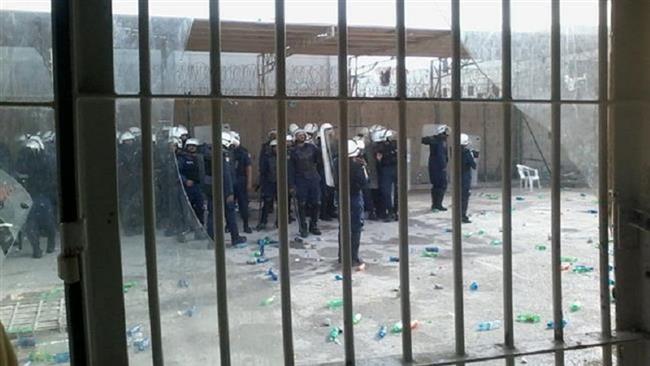
RNA - The prison administration called on riot police to contain the frustration of the political prisoners who had begun a hunger strike since the onset of the month of Muharram, Bahrain Mirror reported.
The detainees end the strike on Saturday after promises from the prison administration to open cells and allow them to commemorate the religious occasion of Ashura, starting on the fifth day of Muharram, as well as allow clerics to move between cells and recite mourning (Aza) eulogies.
Meanwhile, Bahrain's Al-Wefaq National Islamic Society, the largest opposition political group in Bahrain, expressed their deepest condolences over the occasion of Ashura, condemning the Bahraini authorities' continued attacks on Ashura-related religious manifestations.
"We salute the people of our nation who are concentrating all their energies on commemorating this great anniversary," said Al-Wefaq in a statement, adding that they "emphasize the importance of massively attending hussainiyas and Ashura processions and events."
Al-Wefaq noted that this Ashura anniversary "has arrived while our leader, Ayatollah Sheikh Isa Qassim, is besieged and placed under house arrest by the regime, many of our sons and women are in the regime's prisons, and all our institutions, hussainiyas and activities are being targeted and repressed. However, all of this increases our determination to continue in full strength until our demands are met and our pride and dignity are preserved."
Al-Wefaq Society further condemned the Bahraini regime's continued practice of the same violations against the religious manifestations of the Ashura season," deeming "this behavior is a systematic policy and a constant feature every year, representing a determination on fighting religious freedoms and freedom of belief."
"This policy targets a major component of the Islamic communities in the country and restricts religious freedoms, in violation of the constitution and international covenants, and reflects the size of the gap between the regime and the people," the statement added.
Al-Wefaq stressed that "while the regime promotes loose slogans inside the country and abroad, establishes institutions, and sends delegations that talk about Bahrain's embrace of religious tolerance, several regions of Bahrain witness the authorities' continuous use of the policy of sectarian oppression and racial intolerance. 43 violations of Ashura manifestations have been recorded, including assaults on Ashura-related flags, banners and food stands in 15 areas, and summoning or arbitrarily detaining 19 citizens, including managers of hussainiyas and residents, who were later released."
Concluding their statement, the opposition group highlighted that Bahrainis have been practicing these religious rituals in religious seasons for hundreds of years, before the establishment of the modern state in Bahrain and the arrival of the ruling family. "This led the local legislator to dedicate articles to protect this right in explicit texts, alternately in the 1973 Constitution and others. However, the authorities deliberately used this right as a tool of political revenge against the Shiites in Bahrain."
847/940